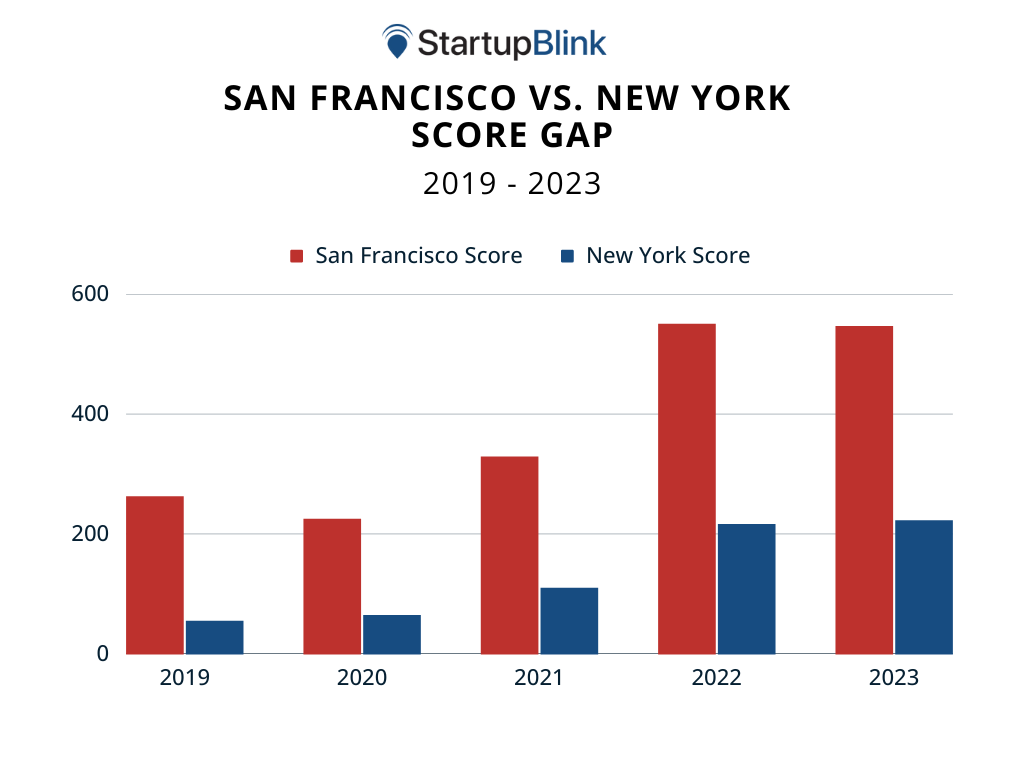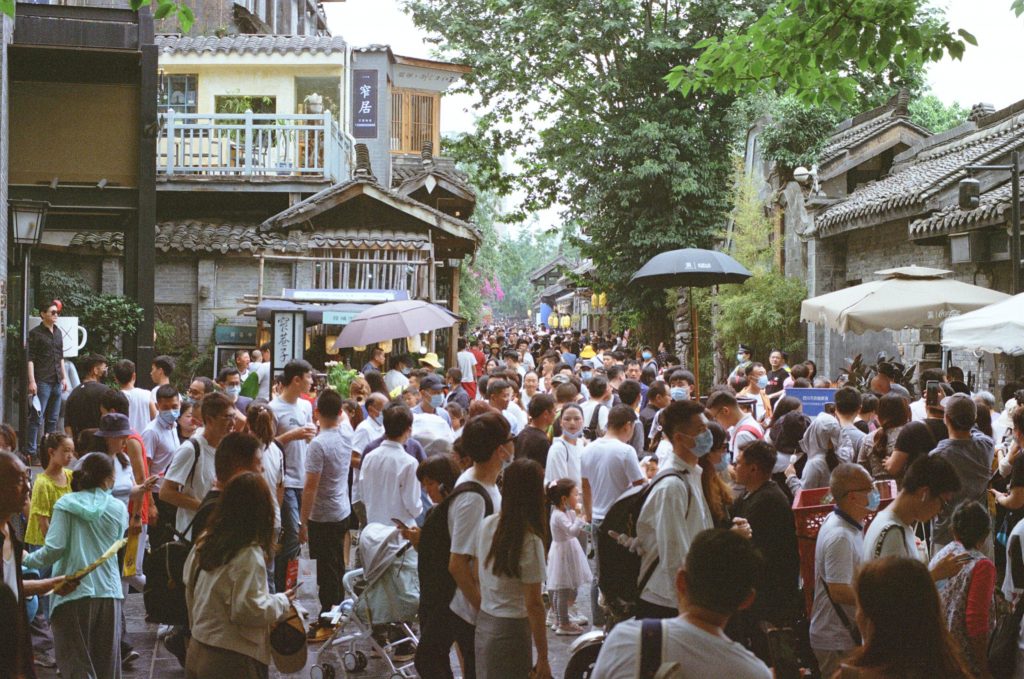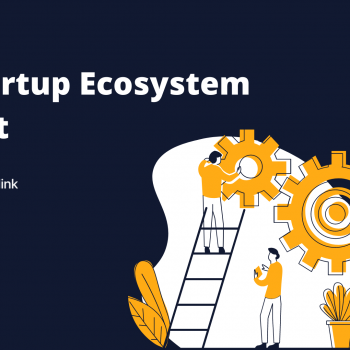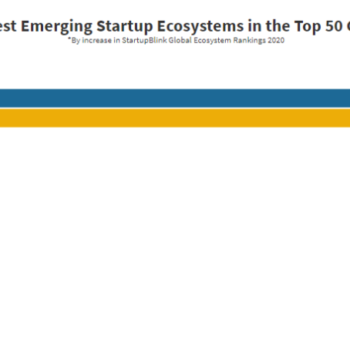At StartupBlink, we always say that where you base your startup highly affects your success. Hence, the Global Startup Ecosystem Index sheds light on location-based decisions for startups and other ecosystem stakeholders. In this episode of the Startup Ecosystem Podcast, Eli David and Martin Jordana go further to discuss the cities of the future for startups. Tune in now to learn their predictions on how the global startup ecosystem will evolve over the next 20 years.
Let’s Begin with the Startup Ecosystems of the Present:
Before moving ahead with the predictions on the cities of the future for startups, let’s talk about who are the current winners in the global startup ecosystem. Here are the top 10 cities based on the Global Startup Ecosystem Index 2023:
As it has been in previous years, San Francisco is the leader of the global startup ecosystem with a total score almost 2.5 times greater than the next ranked city. However, what is different this year is the fact that this is the first year that the gap between San Francisco and other cities did not shrink. In 2022, San Francisco’s score was 2.5 times greater than the next, in 2021, it was 3 times higher, in 2020, it was 3.4 times higher, and in 2019, it was 4.6 times higher.

This implies two things about the future. Firstly, we will see the power of San Francisco distributed among the top 10. Secondly, we will not witness another ecosystem in the same situation as San Francisco. Therefore, the era of the supernova ecosystem is likely to come to an end. Hence, Eli suggests everyone visit and experience this unique city while they can, as it currently stands as the powerhouse of the global startup ecosystem.
How can you identify Cities of the Future for Startups?
First of all, the future is tied to the present, so we should not expect any major changes in the top 10 within the next 20 years. If such a thing were to happen, it would signify potential global concerns, such as more severe consequences of climate change, a deadlier pandemic, or another world war.
Moving onto the signals for identifying the cities of the future for startups, there are two I that we need to ask:
What are the languages of the future?
To this date, native English speaking countries have an unfair advantage over others, as the language of the global startup ecosystem is English. Those countries are able to nurture startups that can scale globally. At some point, there were predictions that Mandarin would become the language of the future, but it is clear that this is not happening anytime soon. According to Statista (2023), there are 1.5 billion English speakers in the world, while Mandarin speakers are 1.1 billion [1].
In light of this information, we can draw the conclusion that countries with native English speakers will likely maintain their top positions. However, there is still an opportunity for cities like Bangalore and Tel Aviv to hold positions at the top. Both cities boast full proficiency in English, making them ideal hubs for developing projects for global markets.
Where are the economies of the future?
The second question to ask is, ‘Where are the economies of the future?’ An important factor in an economy is its population and market size domestically and also regionally.
Population & Market Size of the National Economy

Countries like China and India have an advantage over others, as they possess much larger markets. However, having a large population alone is not sufficient to reach the top 5 or even the top 3. Let’s take China as an example. The country has a massive population but focuses on projects for its domestic economy. This is completely acceptable, as politics, culture, and other factors play a role in such decisions. Nevertheless, when it comes to startup ecosystems, China has the potential to perform much better if it were to target global markets.
Bangalore shows promise in terms of moving up in the rankings. It has a significant population, a massive market size, a growing economy, and English as the spoken language. Consequently, startups in Bangalore have a global reach. We can foresee that Bangalore’s economy and startups will achieve even better positions in the upcoming years
In contrast, islands of innovation like Tel Aviv and Singapore City are making lemonade out of lemons. They have no other option other than building globally scalable startups due to limited population, hence they are in a much better position in terms of reversing the negative effects of a small population.
Size & Language of the Region

A city or country can leverage the size of its regional economy, especially if they are sharing the same language. Latin America is an example of such a region which has produced unicorns like Rappi. Yet, the challenge for Latin America is the language not being English, so on the global scale, Latin American ecosystems are still limited to rise to the top 20. On the other hand, Europe is in a much more difficult position compared to Latin America, as almost every country in the region has a different language, making it harder to expand regional markets.
Check out how the rankings change when we disregard their population size in this article.
Suggestions for Ecosystem Developers:
Based on the discussion Martin and Eli had, there are few recommendations for cities that aim to become future startup hubs.
1. Avoid Brain Drain
Brain drain is the greatest tragedy a city can face, so the focus should be on retaining local talent. San Francisco’s transformation into a hub for highly valued startups can be attributed to the concentration of talent, funding, successful corporations, and resources that have fostered successful projects.
2. Do Not Build for Your Own Ecosystem
Only China can afford to build an ecosystem for itself due to its large population size. Your entrepreneurs need to build business models that are scalable at least on the regional level, but ideally on a global level.
3. Promote Your Ecosystem
Things in startup ecosystems often progress slowly due to factors such as culture and psychology, and changing them takes time. Meanwhile, if there’s only one thing you can do to enhance your startup ecosystem, it’s to start promoting it, regardless of its size and achievements. Ensure that you build a positive perception of your ecosystem. Ten years ago, nobody knew about Lisbon, but with continuous promotion and the hosting of events like WebSummit, it has transformed into a tourist hub. This year, Lisbon has shown remarkable progress, climbing 21 spots and joining the top 7% of StartupBlink’s ranking of 1,000 cities globally.
Learn more about the Startup Ecosystem Promotion in this article.
What if we predict startup cities 100 years into the future?
If we get deeper into predicting the future of the global startup ecosystem 100 years from now, it becomes even more challenging to predict. Possibilities range from startup ecosystems in the cloud to hybrid races. It’s important to note that if we ever witness a drastic change in the rankings of any country, it’s a clear indication that something major has occurred. We observed this a few years ago with Ukraine and Russia, where both ecosystems experienced a significant decline in their rankings. Climbing the ladder takes time, but a single event can lead to a rapid fall.
Reference:
About Us:
StartupBlink is the world’s most comprehensive startup ecosystem map and research center, working with over 100 government entities worldwide. StartupBlink’s global startup ecosystem map has tens of thousands of registered startups, coworking spaces, and accelerators, creating a robust sample of innovation globally.
You can listen the podcast over Spotify & iTunes.







